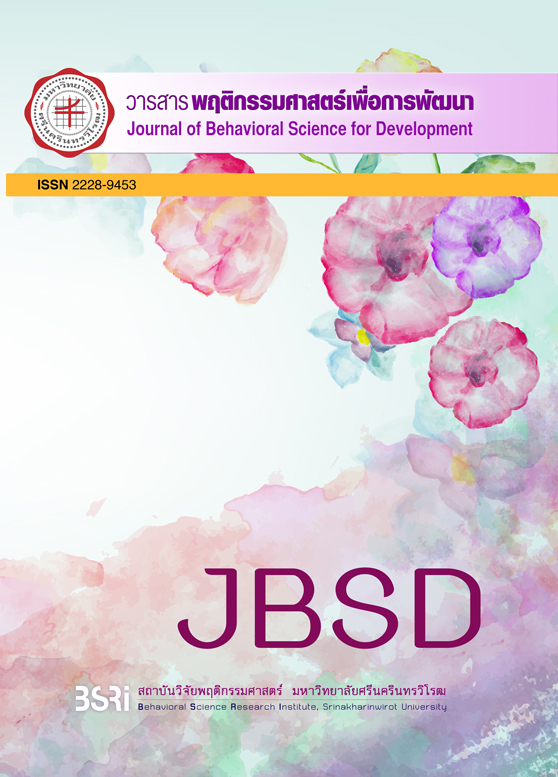Effect of Cognitive Behavioral Therapy Oriented Program for Decreasing Depression Disorder in Drug Addicts ผลของโปรแกรมการปรับพฤติกรรมทางปัญญาที่มีต่อภาวะซึมเศร้าในผู้ป่วยยาเสพติด
Keywords:
cognitive behavioral therapy, depression, drug addictsAbstract
The purpose of this research was to study the effects of cognitive behavior therapy oriented program with the depression in drug addicts. The sample used in this study including experimental group and control group amount 15 people per group. Each group have 7 male and 8 female, totally 30 persons. According to the inclusion criteria and voluntary participant. Experimental design was Control Group Pretest-Posttest Time Series Design. The instruments were the cognitive behavior therapy oriented program on the Depression, Beck Depression Inventory (BDI) and a distorted thinking. The data were analyzed by Three Way Analyses of Variance Containing Repeated Factors. The results were as follows: 1) Considering the interaction between the experimental group - control group with time were different of depression with periods of statistical significance at 0.1 both of experimental group and control group. 2) Experimental group between pretest and posttest. And follow-up. Depression varies significantly, By the significantly .01 term posttest, with follow-up results differ significantly is .05. 3) Controlled group that between pretest and the follow-up, And between posttest and follow up results are statistically significant .01. and 4) No significant difference in depression between males and females. In later stages of the program and follow-up.
Keywords: cognitive behavioral therapy, depression, drug addicts
บทคัดย่อ
การวิจัยครั้งนี้มีวัตถุประสงค์เพื่อศึกษาผลของโปรแกรมการปรับพฤติกรรมทางปัญญาที่มีต่อภาวะซึมเศร้าในผู้ป่วยยาเสพติด กลุ่มตัวอย่างที่ใช้ในการวิจัย แบ่งออกเป็นกลุ่มทดลองและกลุ่มควบคุม โดยแต่ละกลุ่มมีเพศชาย 7 คน และเพศหญิง 8 คน รวมทั้งสิ้น 30 คน ซึ่งมีคุณลักษณะตามเกณฑ์ที่กำหนดและสมัครใจเข้าร่วมการวิจัย แบบแผนการทดลองที่ใช้คือ การวิจัยเชิงทดลอง ชนิดสองกลุ่ม วัดก่อนและหลังทดลอง และวัดซ้ำในช่วงติดตามผลหลังการสิ้นสุดโปรแกรม1 สัปดาห์ เครื่องมือที่ใช้ คือ โปรแกรมการปรับพฤติกรรมทางปัญญาที่มีต่อภาวะซึมเศร้า แบบประเมินภาวะซึมเศร้าของเบค และแบบวัดรูปแบบความคิดที่บิดเบือน สถิติที่ใช้ในการวิเคราะห์ข้อมูล คือ การวิเคราะห์ความแปรปรวนพหุคูณแบบวัดซ้ำ ผลการวิจัยสรุปได้ว่า 1) เมื่อพิจารณาปฏิสัมพันธ์ระหว่างกลุ่มทดลอง-กลุ่มควบคุม กับเวลา พบว่า มีความแตกต่างของภาวะซึมเศร้ากับระยะเวลาอย่างมีนัยสำคัญทางสถิติที่ระดับ 0.1 ทั้งกลุ่มทดลองและกลุ่มควบคุม 2) ผู้ป่วยยาเสพติดที่เข้าร่วมโปรแกรมการปรับพฤติกรรมทางปัญญามีภาวะซึมเศร้า ในระยะก่อนเข้าร่วมโปรแกรมฯ กับระยะหลังสิ้นสุดโปรแกรมฯ และระยะก่อนเข้าร่วมโปรแกรมฯกับระยะติดตามผล แตกต่างกันอย่างมีนัยสำคัญทางสถิติที่ระดับ .01 แต่ในระยะหลังสิ้นสุดโปรแกรมฯกับระยะติดตามผลมีความแตกต่างอย่างมีนัยสำคัญทางสถิติที่ระดับ .05 3) ผู้ป่วยยาเสพติดที่ไม่ได้เข้าร่วมโปรแกรมการปรับพฤติกรรมทางปัญญามีภาวะซึมเศร้าที่แตกต่างจากระยะก่อนการทดลองกับระยะติดตามผลอย่างมีนัยสำคัญทางสถิติ .01 และในระยะหลังสิ้นสุดโปแกรมกับระยะติดตามผล พบความแตกต่างอย่างมีนัยสำคัญทางสถิติที่ระดับ .01 เช่นกัน และ 4) ไม่พบความแตกต่างของภาวะซึมเศร้าระหว่างเพศชายและเพศหญิง ในระยะหลังสิ้นสุดโปรแกรมและระยะติดตามผล
คำสำคัญ: การปรับพฤติกรรมทางปัญญา ภาวะซึมเศร้า ผู้ป่วยยาเสพติด



